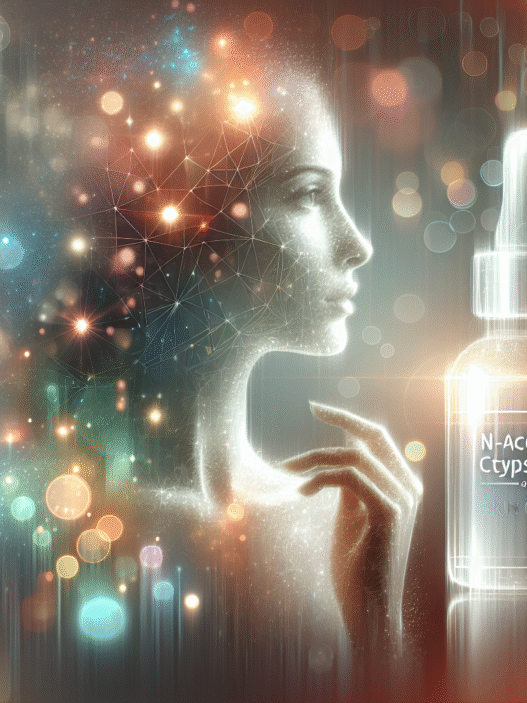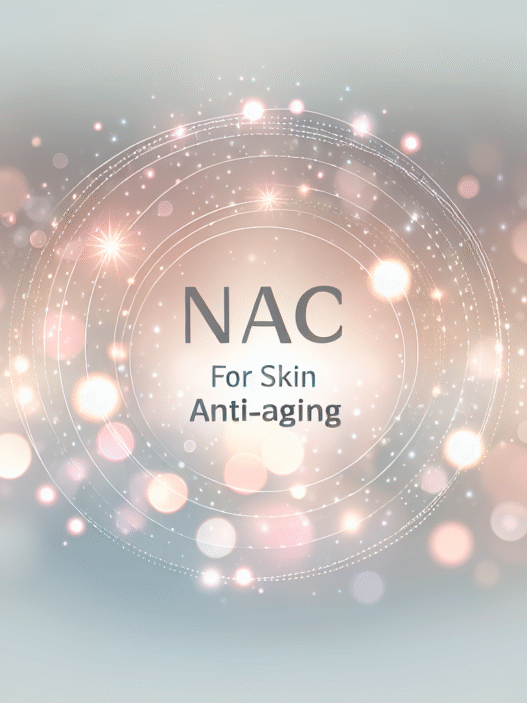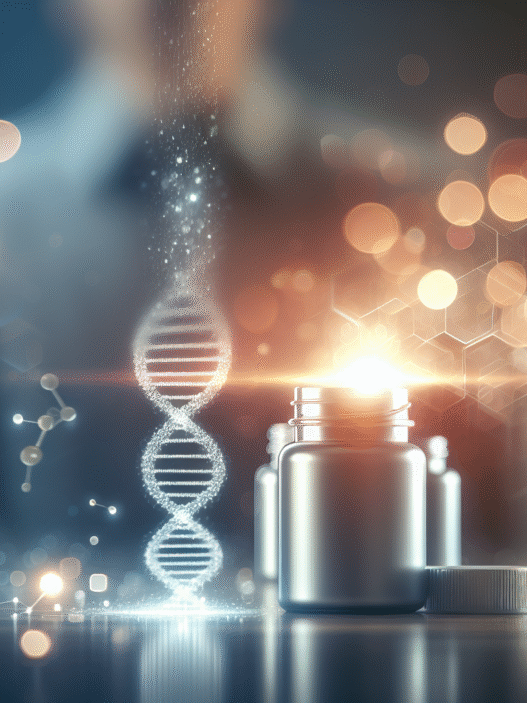Understanding N-Acetyl Cysteine (NAC)
Introduction to NAC
N-Acetyl Cysteine (NAC) is a derivative of the amino acid cysteine, known for its powerful antioxidant properties. It plays a crucial role in replenishing intracellular levels of glutathione, one of the body’s most vital antioxidants. NAC has gained significant attention for its potential health benefits, especially in contexts of liver health, detoxification, and longevity. It has been recognized for its clinical use as an antidote for acetaminophen toxicity, aiding in preventing potential liver damage (NCBI).
Mechanisms of Action
NAC functions primarily through several mechanisms:
-
Antioxidant Activity: NAC increases the production of glutathione, which helps neutralize harmful free radicals and reduce oxidative stress in the body. This process is valuable in protecting cells from damage that might otherwise lead to fatigue and chronic diseases.
-
Detoxification: It aids in detoxifying harmful compounds, particularly in the liver. By converting to cysteine, NAC assists in the replenishment of glutathione levels, facilitating the body’s detoxification pathways.
-
Vasodilation: NAC can dilate blood vessels and promote better blood flow, especially when combined with other medications like nitroglycerin. This effect may contribute to improved circulation and oxygen delivery to muscles, which can enhance performance during physical activities (WebMD).
-
Muscle Performance: Research indicates that NAC may help in minimizing muscle fatigue during exercise by combating oxidative stress that leads to reduced performance.
These mechanisms make NAC a vital supplement for those looking to support their health, particularly in the context of liver function and overall bodily detoxification. To explore more about potential implications of NAC in various health conditions, visit our detailed article on what is nac n-acetyl cysteine used for?.
Benefits of NAC
N-Acetyl Cysteine (NAC) offers a variety of health benefits, particularly in relation to liver health, detoxification, and longevity. Understanding these benefits can help individuals make informed decisions about their health.
NAC in Liver Health
NAC plays a critical role in supporting liver function. It has been recognized as an effective antidote for acetaminophen overdose, which can cause severe liver damage due to glutathione depletion. NAC helps replenish glutathione levels, mitigating hepatic necrosis and protecting liver cells.
Benefits of NAC for Liver Health
| Benefit | Description |
|---|---|
| Glutathione Restoration | Increases levels of glutathione, a powerful antioxidant that protects liver tissue. |
| Detoxification Support | Facilitates the removal of toxins from the liver. |
| Potential Fatty Liver Improvement | May aid in reversing fatty liver conditions (can NAC reverse fatty liver?). |
NAC for Detoxification
Detoxification is another significant benefit of NAC. By promoting the synthesis of glutathione, NAC enhances the body’s ability to eliminate harmful substances, including environmental toxins and metabolic waste. This detoxifying effect is particularly beneficial for individuals exposed to high levels of toxins or looking to improve their overall health.
Key Detoxification Benefits of NAC
| Benefit | Description |
|---|---|
| Toxin Elimination | Increases the detoxifying capacity of the liver. |
| Reduces Oxidative Stress | Helps prevent cellular damage caused by free radicals (does NAC help inflammation?). |
NAC and Longevity
NAC’s antioxidant properties contribute to its potential effects on longevity. By reducing oxidative stress and inflammation, NAC may help protect against age-related diseases and improve overall longevity. Research indicates that NAC can support cellular health and promote better muscular performance, ultimately leading to a better quality of life as individuals age.
Longevity Benefits of NAC
| Benefit | Description |
|---|---|
| Cellular Protection | Shields cells from damage, potentially increasing lifespan. |
| Muscle Performance Enhancement | Improves endurance and reduces fatigue, facilitating an active lifestyle. |
| Anti-Aging Effects | Fights oxidative stress related to aging processes. |
Exploring NAC’s health benefits reveals its multifaceted role in promoting liver health, aiding detoxification, and supporting longevity. For further details on what NAC can be used for, check our article on what is nac n-acetyl cysteine used for?.
Side Effects of NAC
N-Acetyl Cysteine (NAC) is generally well-tolerated, but some individuals may experience side effects. It’s important to understand these potential reactions to make informed decisions about its use, especially for those concerned about liver health or seeking detoxification.
Hypersensitivity Reactions
NAC can lead to hypersensitivity reactions in some users. Symptoms may include airway obstruction, angioedema (swelling beneath the skin), tachycardia (rapid heartbeat), and urticaria (hives). These reactions are more likely to occur during or at the end of the loading dose infusion and may be related to the dose administered.
| Reaction Type | Symptoms |
|---|---|
| Airway Obstruction | Difficulty breathing |
| Angioedema | Swelling of the face or throat |
| Tachycardia | Rapid heart rate |
| Urticaria | Hives or itchy welts |
More details on these reactions can be found on Drugs.com.
Gastrointestinal and Respiratory Symptoms
Gastrointestinal issues are common and may manifest as nausea, vomiting, or bloating. Additionally, respiratory symptoms can occur, including cough, wheezing, shortness of breath, and chest tightness. The occurrence of respiratory distress or bronchospasm should be taken seriously, as they may indicate a severe reaction.
| Symptom Type | Possible Symptoms |
|---|---|
| Gastrointestinal Symptoms | Nausea, vomiting, bloating |
| Respiratory Symptoms | Cough, wheezing, stridor, shortness of breath |
Symptoms are outlined in further detail at Drugs.com.
Cardiovascular and Dermatologic Effects
NAC use may lead to various cardiovascular responses and skin reactions. Common cardiovascular effects include hypotension (low blood pressure) and shock, which can occur during dosing. Skin reactions may include flushing and rashes. These effects emphasize the need for caution when using NAC, particularly in individuals with pre-existing conditions or sensitivities.
| Effect Type | Symptoms |
|---|---|
| Cardiovascular Effects | Hypotension, shock |
| Dermatologic Effects | Flushing, skin rash |
Consulting with a healthcare professional can provide personalized advice regarding the use of NAC and its side effects. For information about potential negative side effects, visit what are the negative side effects of nac?.
NAC and Disease Prevention
N-Acetyl Cysteine (NAC) has garnered attention for its potential role in disease prevention, particularly in relation to muscle fatigue, neurodegenerative diseases, and mental health. This section explores these aspects in detail.
NAC in Muscle Fatigue
Research indicates that NAC pretreatment can enhance muscle performance during rigorous exercise by addressing oxidative stress, which is believed to contribute to fatigue. A study found that NAC significantly mitigated muscle fatigue, suggesting that antioxidant therapy could serve as an effective intervention for those experiencing fatigue during physical activity.
| Key Finding | Effect |
|---|---|
| NAC and Muscle Performance | Improved performance during fatiguing exercise |
NAC in Neurodegenerative Diseases
NAC may play a protective role in brain health. It helps replenish glutathione levels, a powerful antioxidant, while also regulating the neurotransmitter glutamate. This can assist in reducing inflammation and oxidative stress, thereby benefiting individuals with neurodegenerative conditions, such as Alzheimer’s and Parkinson’s diseases.
| Neurodegenerative Condition | Potential NAC Benefit |
|---|---|
| Alzheimer’s Disease | Reduces oxidative stress, supports brain function |
| Parkinson’s Disease | May lessen inflammation and brain damage |
NAC for Mental Health
Emerging evidence suggests that NAC could also impact mental health positively. It is thought to help improve conditions that interfere with mood regulation by balancing neurotransmitters and lowering oxidative stress. Some studies indicate that NAC supplementation may be beneficial for individuals with anxiety disorders (WebMD).
| Mental Health Application | NAC’s Role |
|---|---|
| Anxiety Disorders | May help regulate mood via neurotransmitter balance |
NAC presents various benefits in disease prevention, especially concerning muscle fatigue, neurodegenerative diseases, and mental health disorders. For more information on the uses and benefits of NAC, check our article on what is nac n-acetyl cysteine used for?.
NAC Interactions and Considerations
Understanding the interactions and considerations associated with N-Acetyl Cysteine (NAC) is essential for anyone looking to utilize its benefits safely and effectively. This section discusses NAC’s interactions with medications, dosage recommendations, and administration methods.
NAC and Medication Interactions
NAC may impact various medications and their effectiveness. Some notable interactions include:
- Blood Thinners: NAC can slow blood clotting. When taken with anticoagulants like warfarin, it may increase the risk of bleeding or bruising.
- Nitroglycerin: NAC can dilate blood vessels and enhance blood flow. When combined with nitroglycerin, it may increase the risk of side effects such as headache, dizziness, and lightheadedness (WebMD).
- Antimalarial Medications: NAC may reduce the efficacy of chloroquine against malaria, suggesting a potential interaction between these substances (WebMD).
- Antihypertensive Agents: NAC could lower blood pressure. When taken with other antihypertensive drugs, it may potentially cause blood pressure to dip too low.
Dosage Considerations
The appropriate dosage of NAC can vary widely based on individual health needs and the intended use. High-dose NAC (1,200 mg per day) has been noted to help reduce inflammation and oxidative stress, particularly in individuals with conditions like cystic fibrosis.
| Condition | Recommended Dose |
|---|---|
| General Health | 600 mg to 1,200 mg per day |
| Cystic Fibrosis | 1,200 mg per day or higher |
| Detoxification | 600 mg to 1,200 mg per day |
Consulting a healthcare provider before starting NAC is important to determine the right dosage tailored to individual health circumstances.
Administration Methods
NAC is available in several forms, each affecting its administration:
- Capsules/Tablets: Convenient for daily use. Typically taken orally with water.
- Powder: Can be mixed with water or juice. This form may offer improved absorption rates.
- Injectable: Administered in clinical settings, typically for acute conditions.
Individuals should choose an administration method that best fits their lifestyle and health requirements. Regardless of the method, following the suggested dosing instructions and adhering to professional medical advice is crucial for safety and effectiveness.
For more insights into NAC’s applications and benefits, visit our article on what is NAC N-Acetyl Cysteine used for?.
Research on NAC
In examining N-Acetyl Cysteine (NAC), understanding the clinical trials, efficacy, and safety profile is essential for individuals interested in its health benefits, particularly for liver health and detoxification.
Clinical Trials on NAC
Multiple clinical trials have explored the effects of NAC on various health conditions. One significant area of research includes its application in reducing inflammation, oxidative stress, and insulin resistance, particularly concerning obesity-related issues. Current findings suggest that NAC may assist in controlling fat storage and energy metabolism, but additional studies are necessary to confirm these effects.
Moreover, high-dose NAC (approximately 1,200 milligrams per day) has been shown to be beneficial in cases of cystic fibrosis. It can enhance lung function by breaking up biofilms and minimizing oxidative stress in the airways, either alone or in combination with other treatments.
| Condition/Study Focus | NAC Dosage | Observed Benefits |
|---|---|---|
| Obesity and Energy Metabolism | <1,200 mg/day | May lower inflammation, oxidative stress |
| Cystic Fibrosis | 1,200 mg/day | Reduces lung damage, enhances airway function |
Efficacy of NAC
NAC has demonstrated several favorable health outcomes across various clinical studies. It may play a critical role in improving fertility in individuals of all sexes. Research indicates that NAC can enhance semen quality in men and regulate ovulation in women, particularly those with conditions such as polycystic ovary syndrome (PCOS). Additionally, NAC appears beneficial for protecting brain health. By replenishing glutathione levels, it helps control neurotransmitter levels and protects against oxidative damage, which can be advantageous for people with neurodegenerative diseases like Alzheimer’s and Parkinson’s (WebMD).
Safety Profile of NAC
The safety of NAC has been assessed in numerous research settings, generally showing that it is well-tolerated by most individuals. However, potential interactions with medications, particularly those that lower blood pressure, warrant attention. Close monitoring of blood pressure is advised for individuals taking NAC alongside antihypertensive drugs. Awareness of side effects is also crucial. Common issues may include gastrointestinal discomfort and hypersensitivity reactions. Individuals considering NAC supplementation should consult with healthcare providers to evaluate the risks and benefits in their specific contexts.
Careful analysis of this research is vital for those curious about NAC’s effects, including why it may be associated with feelings of fatigue in certain individuals. For further reading on side effects, visit our article on what are the negative side effects of nac?.



















